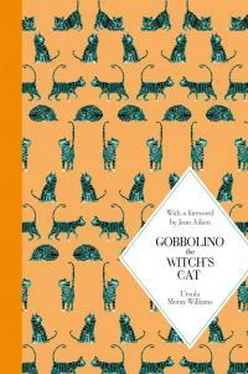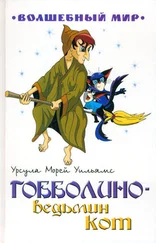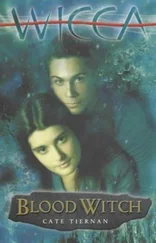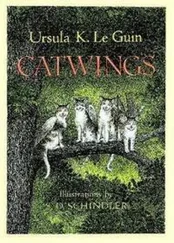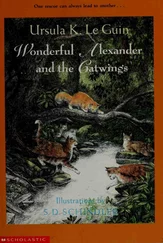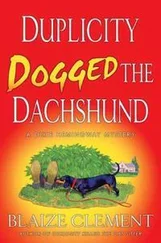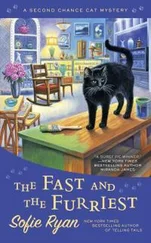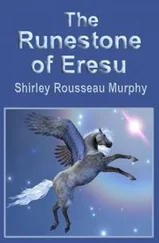The little cat did not know his danger, and it was lucky for him that the children of the farm were playing on the river bank just above the mill-stream.
“Look! Look!” they cried to one another. “Here comes a kitten swimming for its life!”
“It will get caught in the mill-wheel!” said one of the little girls. “Quick! Quick! And get it out!”
Her brothers ran to get a stick and fished out Gobbolino as they might have fished a plum out of one of their mother’s pies.
“What a black coat he has!” they said.
“It is almost tabby!” said the little girls.
“And what bright eyes!” said their brothers.
“They are a beautiful blue!” said the little girls.
“He has three black paws!” said the boys.
“But one is pure white!” said the girls.
They took Gobbolino into the farm to show him to their mother.
The farm was fine and big, and it was the kind of kitchen Gobbolino had dreamed of.
There were red stone tiles and bright pots and pans sitting on shelves all the way round the room. There was a blazing fire in the hearth and a kettle singing on the hob. There was a baby in a cradle that rocked as the children’s mother pushed it gently to and fro.
“Oh, what a lucky cat I am!” he said to himself, in spite of his weariness and cold. “Here is the first house I come to, the home of my dreams! A friendly roof, a good fire, a worthy mother, and kind-hearted children! Now I can settle down happily and be a plain little kitchen cat for ever and ever.”
The farmer’s wife took Gobbolino on her lap and wiped his wet fur with a warm cloth.
“And where do you come from, my little cat?” she asked him kindly. “How did you come to fall in the terrible mill-stream? Don’t you know you might have been drowned?”
“Yes, ma’am!” replied Gobbolino gratefully. “I fell in catching fishes. I come from the cavern in the forest up yonder, and the river brought me down here.”
When his fur was dry the farmer’s wife gave him a good drink of warm milk, and while she went out to milk the cows he amused the children and the baby by all kinds of strange tricks that every witch’s kitten knows by heart. He made blue sparks come out of his whiskers and red ones out of his nose. He became invisible and then visible again, and hid himself in all kinds of strange places for them to find him again, in the cuckoo clock, in a teacup, in the farmer’s shoe, till the children were tired of laughter and begged him to be quiet, and give them a little peace.
In the middle of all this the farmer himself came in to tea. He kissed the children all round, but when he saw Gobbolino at his tricks he suddenly became very grave, and soon shooed them all off to bed in a hurry, while the little cat curled himself up in a wooden box under the kitchen table that the farmer’s wife herself had provided for him there.
“What a lucky cat I am,” he said, as he tucked away his three black paws and the white one and closed his beautiful blue eyes. “Now my troubles are over for ever and ever. I am Gobbolino the kitchen cat.”
4
Hobgoblin
As little Gobbolino slept sweetly beneath the kitchen table the voices of the farmer and his wife mingled with his dreams.
“Where did that kitten come from, mother?”
“The children found it swimming in the millrace, father.”
“Kittens don’t swim, mother.”
“The children said it was swimming for its life.”
“It seems strange to me, mother, that a kitten should find itself in the millrace unless somebody tried to drown it.”
“It fell in catching fishes, it said. It came from the cavern on the hill.”
“Ah!” said the farmer, and he was silent for a long while.
“Did you see the tricks it was after when I came in?” he asked presently.
“I heard the children laughing, from the cowshed,” said the farmer’s wife. “It was playing with a cotton reel.”
“It was playing stranger tricks than that,” said the farmer. “Sparks in its ears, sparks in its eyes, vanishing, popping out of cuckoo clocks – that’s no way for a kitten to behave, mother.”
“The sparks came out of the fire, and the children put it in the cuckoo clock,” said the farmer’s wife.
The farmer was silent again for several minutes.
“It’s a strange-looking kitten, mother,” he said at last.
“The children are very fond of it,” replied the farmer’s wife.
The farmer said no more about it, and soon enough they went to bed, while Gobbolino slept and purred and dreamed and the sparks died out of the fire, and a hobgoblin tapped at the windowpane.
Tap! Tap! Tap! Tap! Tap!
Now every kitchen cat knows that when a tap comes on the window after dark no notice should be taken of it at all. If it is a stranger looking for shelter, sooner or later he will wake the farmer up, but the kitchen cat goes on sleeping under the table. It has nothing to do with him.
But little Gobbolino, who had never been a kitchen cat before, sat up immediately with his ears a-prick and whispered:
“Who goes there?”
Tap! Tap! Tap! Tap! Tap!
The hobgoblin peeped in through the window and winked at Gobbolino.
He had a little brown face and a little brown cap, and he beckoned with a little brown finger, whispering:
“Come and let me in, my little cat, now do!”
Gobbolino sat and stared at him, saying nothing at all.
“What a lovely kitchen you have, my little friend!” sighed the hobgoblin. “What bright dishes! What glittering pans! What a pretty cradle! What a nice warm hearth! Won’t you let me come in and warm my toes, my pretty one?”
Gobbolino only sat and stared at him, saying nothing at all.
The hobgoblin became very impatient, and rattled at the windowpane, saying:
“You kitchen cats are all alike! All selfish! All self-satisfied! Look at you warming your toes in safety and comfort, and look at me, all lonely and lost in the cold outside!”
When Gobbolino heard these words he did not hesitate any longer. He remembered how a short while ago he too had been lonely and lost, and might be still if the children had not brought him into the farm. When the hobgoblin called him a kitchen cat he remembered how lucky he was, and trotted straight across to open the window.
“You may come in and warm your toes for a little while beside the fire,” he said.
The hobgoblin slipped across the table and sat down on the hearth beside Gobbolino, leaving dirty wet footmarks all across the kitchen floor.
“How is all your family?” he asked in a friendly manner, giving Gobbolino’s tail a friendly tweak.
“My mother Grimalkin has gone away with my mistress the witch!” replied Gobbolino. “And my little sister Sootica is apprenticed to a hag in the Hurricane Mountains. I don’t know how any of them are.”
“Oho!” said the hobgoblin with a gleam of mischief. “So you are a witch’s kitten?”
“Oh, no!” said Gobbolino shaking his head, “I am no longer any witch’s cat. This afternoon I became a kitchen cat, and a kitchen cat I shall be for ever and ever.”
“Ha! Ha! Ha!” laughed the hobgoblin, turning head over heels as if he thought Gobbolino was the greatest joke in the world. His somersault brought the farmer’s wife’s knitting off the chair, and in a moment it was tangled round the table legs, the pins were strewn over the floor, and the stitches running higgledy-piggledy after one another in greatest confusion.
“Take care! Take care!” cried Gobbolino, but the hobgoblin made one bound into the dairy and slammed the door.
Now every kitchen cat knows that no one may enter the dairy between sundown and sunrise, except the farmer’s wife, but Gobbolino had no idea of it.
Читать дальше
